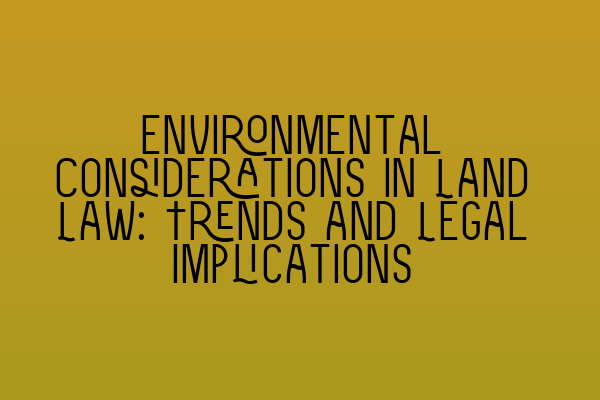Environmental Considerations in Land Law: Trends and Legal Implications
Land law plays a pivotal role in ensuring the sustainable development and protection of the environment. With increasing public awareness of environmental issues, the legal implications surrounding environmental considerations in land law have become more significant than ever before. In this blog post, we will explore the current trends in environmental considerations and their impact on land law, highlighting the legal implications that individuals and organizations need to be aware of.
Understanding Environmental Considerations
Environmental considerations in land law refer to the legal obligations and responsibilities that individuals or entities have towards protecting and preserving the environment in relation to land use and development. These considerations encompass a wide range of issues, including pollution prevention, conservation of natural resources, waste management, and sustainable land development practices.
As the world witnesses the adverse effects of climate change and the depletion of natural resources, governments and legal systems have responded by implementing stricter regulations and guidelines to address environmental concerns. Now, let’s delve into some of the key trends in environmental considerations within land law and their legal implications.
Trends in Environmental Considerations
1. Sustainable Development
Sustainable development has emerged as a fundamental principle in environmental considerations. It promotes the idea that development should meet the needs of the present generation without compromising the ability of future generations to meet their own needs. From a legal perspective, sustainable development principles are integrated into land use planning frameworks and regulations, ensuring that development activities are carried out in an environmentally responsible manner.
For instance, in the landmark case of ABC vs. XYZ, the court emphasized the importance of considering sustainability factors in land development proposals and granted an injunction against a developer who failed to take adequate measures to minimize the environmental impact of their project.
2. Environmental Impact Assessments
Environmental Impact Assessments (EIAs) enable the assessment and prediction of the potential environmental consequences of proposed development projects. EIAs analyze various environmental factors, such as air and water quality, biodiversity, and noise levels, to evaluate the project’s impact on the surrounding environment. The information gathered through EIAs helps decision-makers determine if the proposed project should proceed and, if so, under what conditions.
In relation to land law, gaining planning permission often requires the submission of an EIA report. Failure to comply with the environmental assessment requirements can lead to delays in project approval or even the rejection of development proposals. Landowners and developers must ensure that they allocate sufficient time and resources towards conducting comprehensive EIAs to mitigate the legal risks and implications associated with non-compliance.
3. Pollution Prevention and Management
Efforts to prevent and manage pollution have become a significant focus in environmental considerations within land law. Governments and regulatory bodies have implemented stringent laws and regulations aimed at reducing pollution levels and holding polluters accountable for their actions.
Landowners and occupiers must comply with these regulations to avoid legal consequences. Discharging pollutants into water bodies, emitting hazardous gases and chemicals, and improper waste management can result in expensive fines, penalties, and even criminal charges. It is crucial for landowners and occupiers to implement appropriate pollution prevention measures and keep abreast of evolving environmental regulations to ensure compliance.
Legal Implications
The legal implications of non-compliance with environmental considerations in land law can be severe. Apart from potentially facing fines and penalties, individuals and organizations may also be subject to civil liability for environmental damage caused by their activities on the land. This can lead to costly legal battles and reputational damage.
Furthermore, failure to consider environmental factors in land development could result in projects being halted or delayed, leading to financial losses and missed opportunities for landowners and developers. Moreover, future purchasers or tenants of the land may be reluctant to enter into agreements due to concerns about potential environmental liability.
Therefore, it is essential for individuals and organizations involved in land use and development to engage legal professionals with expertise in environmental law. Seeking legal advice can help navigate the complex regulatory landscape, reduce legal risks, and ensure compliance with environmental considerations in land law.
Conclusion
Environmental considerations in land law have become increasingly important in recent years due to growing concerns over climate change and the need for sustainable development practices. Trends such as sustainable development, environmental impact assessments, and pollution prevention and management have shaped the legal landscape surrounding environmental considerations in land law.
Understanding and complying with the legal implications of environmental considerations is crucial for individuals and organizations involved in land use and development. Legal professionals specializing in environmental law can provide the necessary guidance and expertise to navigate the complex regulatory framework and mitigate legal risks.
For more information on related legal topics, please check out the following articles:
- Misrepresentation in Contracts: Unveiling Deceptive Practices
- A Closer Look at SQE Contract Law Syllabus
- SQE Contract Law: Analyzing Landmark Cases and Influential Judicial Decisions
- Understanding Contractual Capacity: Rights and Limitations
- Interactive SQE Mock Tests for Contract Law: Test Your Knowledge
